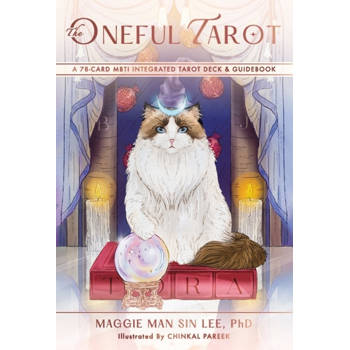◎
The Oneful Tarot’s court cards are based on the MBTI (Myers-Briggs Type
Indicator), which categorizes us into 16 archetypes as a personality
typology. As this is a very popular system in our modern times, using it
in our Tarot deck will aid our understanding of the types.
Archetypes are universal, innate models for certain aspects of identity and personality that influence human behavior. They are part of our psyche, forming the basis of our personality, our drives, feelings, beliefs, motivations and actions.
Archetypes are what Carl Gustav Jung first conceptualized as a derivation of the “collective unconsciousness.” He describes “a second psychic system of a collective, universal and impersonal nature that is identical in all individuals”, which in his time was largely composed of the archetypes and mythological figures such as Mother, Child, Trickster, Prostitute, etc. in his time.
Today, MBTI leans on these concepts from Jung to shed light on personality archetypes in five dimensions:
• Energy (extroverted [E] or introverted [I])
• Mind (observant [S] or intuitive [N])
• Nature (thinking [T] or feeling [F])
• Tactics (judging [J] or perceiving [P])
• Identity (assertive [-A] and turbulent [-T])
Each archetype exhibits traits of the four dimensions mentioned above, e.g. the Architect INTJ embodies an introverted, intuitive, thinking and judging personality.
These archetypes bear a great resemblance to the personality of the individual Court
cards.
Court cards can represent an actual person who influences you, or aspects of yourself. When we work with the Oneful Tarot, the Court cards will point out a person’s traits that we should pay attention to by becoming aware of them, showing them understanding, and having compassion for them.
• Light and Shadow •
When we embody an archetype, there’s always a side that faces the sun and a side that is covered by shadow. We live in a self that we revere, and there must of course be a part of this energy that lies in the dark and is not recognised, avoided or abandoned. When we get to know the light and shadow sides, we can facilitate integration and become whole.
If the Court cards are revealed in a right-side up orientation, read the light attributes and if they are reversed, read the shadow attributes.
ARCHITECT INTJ - QUEEN OF SWORDS
Light – VISIONARY
Awareness: You see potential in what others think is impossible, and solving problems is your way of finding light in life.
Understanding: Your visions are sometimes a far-reaching light, but others need time to let it travel to their retinas, so you will need to have patience to create more understanding.
Compassion: If you are frustrated because people do not see things through, give them space and trust that they can learn by following their own path.
Shadow – ADDICTION
Awareness: When thinking becomes too much, you may need some distraction from the overwhelming stress.
Understanding: Feelings of restlessness and emptiness are experienced by everyone; you are not alone.
Compassion: Find peace by focusing on your breath—that is what fuels your life, not any other substance.
The Oneful Tarot’s court cards are based on the MBTI (Myers-Briggs Type
Indicator), which categorizes us into 16 archetypes as a personality
typology. As this is a very popular system in our modern times, using it
in our Tarot deck will aid our understanding of the types.
Archetypes are universal, innate models for certain aspects of identity and personality that influence human behavior. They are part of our psyche, forming the basis of our personality, our drives, feelings, beliefs, motivations and actions.
Archetypes are what Carl Gustav Jung first conceptualized as a derivation of the “collective unconsciousness.” He describes “a second psychic system of a collective, universal and impersonal nature that is identical in all individuals”, which in his time was largely composed of the archetypes and mythological figures such as Mother, Child, Trickster, Prostitute, etc. in his time.
Today, MBTI leans on these concepts from Jung to shed light on personality archetypes in five dimensions:
• Energy (extroverted [E] or introverted [I])
• Mind (observant [S] or intuitive [N])
• Nature (thinking [T] or feeling [F])
• Tactics (judging [J] or perceiving [P])
• Identity (assertive [-A] and turbulent [-T])
Each archetype exhibits traits of the four dimensions mentioned above, e.g. the Architect INTJ embodies an introverted, intuitive, thinking and judging personality.
These archetypes bear a great resemblance to the personality of the individual Court
cards.
Court cards can represent an actual person who influences you, or aspects of yourself. When we work with the Oneful Tarot, the Court cards will point out a person’s traits that we should pay attention to by becoming aware of them, showing them understanding, and having compassion for them.
• Light and Shadow •
When we embody an archetype, there’s always a side that faces the sun and a side that is covered by shadow. We live in a self that we revere, and there must of course be a part of this energy that lies in the dark and is not recognised, avoided or abandoned. When we get to know the light and shadow sides, we can facilitate integration and become whole.
If the Court cards are revealed in a right-side up orientation, read the light attributes and if they are reversed, read the shadow attributes.
ARCHITECT INTJ - QUEEN OF SWORDS
Light – VISIONARY
Awareness: You see potential in what others think is impossible, and solving problems is your way of finding light in life.
Understanding: Your visions are sometimes a far-reaching light, but others need time to let it travel to their retinas, so you will need to have patience to create more understanding.
Compassion: If you are frustrated because people do not see things through, give them space and trust that they can learn by following their own path.
Shadow – ADDICTION
Awareness: When thinking becomes too much, you may need some distraction from the overwhelming stress.
Understanding: Feelings of restlessness and emptiness are experienced by everyone; you are not alone.
Compassion: Find peace by focusing on your breath—that is what fuels your life, not any other substance.



